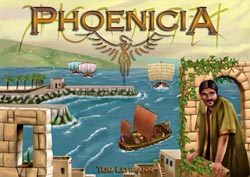


These are the best games I played in 2007, not necessarily released in that year and ignoring those that I didn’t get to play. In particular, those that may have appeared had I managed to get them to the table before the year end include Agricola (waiting for the English version), Brass (a Martin Wallace economic game) and Race for the Galaxy (a San Juan development that I have played in 2008, but needs more plays to give a decent assessment). Anyway, these are my picks:
Phoenicia is a development of Outpost that retains the flavour of the original but plays much quicker. Lots of possible paths to follow to find a winning strategy and nicely produced by JKLM.
Age of Empires III is a brilliant game based on the computer game that is beautifully produced by Tropical Games. Again, plenty of different strategies to pursue and one of the few real gamers’ games released this year that plays with six.
Caylus: Magna Carta takes the original highly rated board game, simplifies and shortens the game play to make it even better and presents it as a card game. I’m not sure I need to play the board game version again as the streamlining is superb, in much the same way as I prefer San Juan to Puerto Rico.



Notre Dame was Alea’s big release of 2007 and turned out to be another superb game. Lots to think about in this one with a nice card drafting mechanic where the cards you play are determined partly by you and partly by the player on your right. Also, the need to control your rat population gives an extra layer of tension.
1960: The Making of the President is an excellent two player area control game. The cards do a great job of instilling atmosphere with the events portrayed and getting the balance between canvassing support in the states, controlling the media and gaining the upper hand in the key policy issues.
Pillars of the Earth was a worthy winner of the 2007 Deutsche Spiel Preis as it does a great job of translating Ken Follett’s book into an engaging board game. Similar in style to the way Caylus plays, PotE succeeds in streamlining the number of choices to be made while leaving lots of tough decisions to be made.
